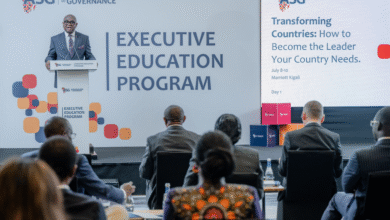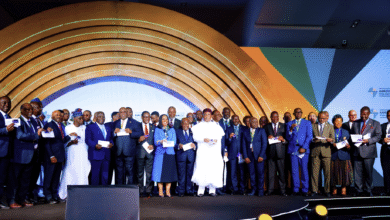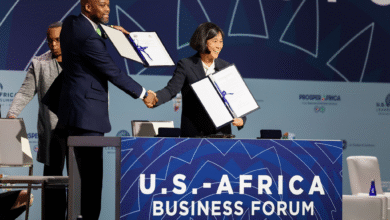Train midwives and health workers has become a priority in Africa. To fight against maternal and infant mortality, the first public health NGOs in Africa, AMREF Flying Doctors, offers several e-health programs. We gave the floor to Dr. Bara Ndiaye, head of the West Africa AMREF program, to tell us a little more.
Train midwives and health workers has become a priority in Africa. To fight against maternal and infant mortality, the first public health NGOs in Africa, AMREF Flying Doctors, offers several e-health programs. We gave the floor to Dr. Bara Ndiaye, head of the West Africa AMREF program, to tell us a little more.
Today and according to figures from AMREF, a woman dies every 3 minutes for lack of basic care during pregnancy and childbirth. This first public health NGOs in Africa, established in 1958, launched a « Flying Doctors » program. It is estimated that 80% of maternal deaths could be prevented with midwives. And for that, this program plans to train 15 000 people to the profession. The doctor and head of AMREF’s programs in West Africa, Bara Ndiaye, works to educate midwives in Africa by e-learning. It also examines the projects and oversees the actions undertaken in West Africa.AMREF is working to build sustainable public health projects and has forged links with governments and communities. All this, in order to carry out its various training programs for local nurses and midwives.
What are your findings about infant and maternal mortality in Africa?
When it comes to West Africa, women and children are the most vulnerable in maternal mortality. In Senegal, mortality is 392 per 1,000 live births. In Guinea, for instance, the situation is even worse, we recorded a mortality rate of up to 500 per 1,000 live births. Among our objectives is also that of ensuring the child a quality monitoring to the age of five, by administering the necessary care to its development. We try to meet each challenge and wish to strengthen African health systems by inviting governments and communities to actively participate in our actions. We need to train midwives and sensitize pregnant women to give birth in a suitable structures.
What are the reasons for these high mortality rates?
The main factor behind this mortality is the lack of deliveries structures. Furthermore, women do not always have access to care from qualified and well trained staff. The cultural character is also among the factors contributing to maternal and infant mortality. Women in Africa are not sufficiently sensitized to give birth in a hospital or clinic. The factors of geographical and financial accessibility and inadequate human resources also explain the significant number of maternal and infant mortality on the continent. In order to allow every woman to benefit from appropriate attention and care ,it is crucial to increase the staff in hospitals.
Can you present the programs of this NGO?
First of all, it is important to underline that AMREF « Flying Doctors » conducts health programs, surgical missions, medical personnel and paramedical training and public health assessments in more than thirty countries in Africa. In Senegal, as elsewhere, we act on four key elements to the human being. The first of them is the health of mother and child, then comes the one about access to water and sanitation, and the surgical support, not to mention the training of health personnel . We have three different approaches to these programs. The first strategy helps to fight against potential health problems encountered by pregnant women. The second strategy we propose is to increase human resources in health. The third axis of our actions is to strengthen innovation and technology. These three axes enable us to obtain the four public health projects I have previously indicated. We also want to improve services in health structures in order to allow a better access. You should know that each program includes a section on prevention, but also on detection and treatment.
Who are your partners?
We have institutional and private partners, which are mostly companies. They are involved in this public-private partnership approach, to support NGOs. Their financial support to West Africa is about a billion dollars annually. This money is distributed based on well defined projects and action plans.
How are taught the courses for midwives at AMREF?
It is with the method of AMREF e-learning that midwives can develop and improve their skills. Thanks to a platform on the web, they can learn but also be evaluated. We train teachers to use this platform, but also tutors supervising students during internships. We also offer a program through mobile phones to track women previously identified as pregnant in order to provide them the best care, and reassure them about health structures. We also offer access to courses via a telemedicine kit for developing advanced strategies and perform ultrasounds, blood tests …
Interview by Darine Habchi







